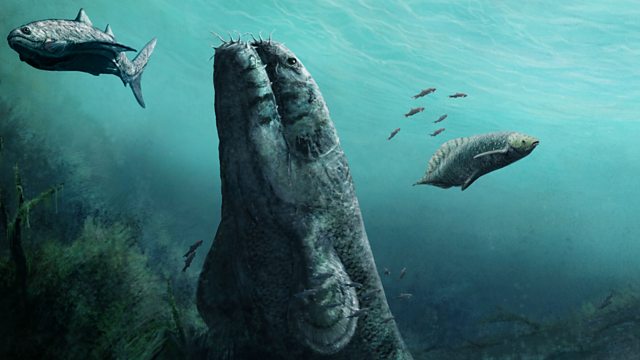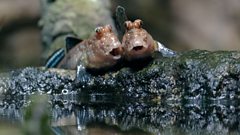How Did Life Get onto Land?
Humans have an unlikely ancestor – fish. But how did a fully aquatic animal leave the water and walk on land? We investigate one of the most crucial events in evolutionary history
People often talk about being descended from apes. But go back a bit further and we have a more unlikely ancestor – fish. Improbable as it may sound, the creature that gave rise to every bird, reptile and mammal on Earth today lived a fully aquatic life.
So how did it switch to life on land? And how hard was it to swap swimming for walking and breathing fresh air? That’s what CrowdScience listener Pierre in France wants to know, and what Marnie Chesterton is in Scotland to find out. She goes fossil hunting with members of the TW:eed Project team, as they try to uncover remains of creatures that are crucial in helping solve the puzzle of terrestrial life. She also discovers the landscape these early ancestors walked into – an alien and relatively empty world completely different to what we see today - where grass and flowers were yet to evolve.
But not everything in this story is preserved in rock. Marnie goes to see a living relic of this period of evolution, and finds out what it can tell us about possibly the most important event in the history of our species.
Do you have a question we can turn into a programme? Email us at crowdscience@bbc.co.uk
Presenter: Marnie Chesterton
Producer: Anna Lacey
(Image: Artists impression of underwater environment of Carboniferous swamp depicting a rhizodont; a large predatory fish. Credit: Mark Witton)
Last on
More episodes
Previous
Clip
-
![]()
Why did fish move onto land?
Duration: 02:05
Broadcasts
- Fri 3 Nov 2017 20:32GMT�������� World Service Online, Americas and the Caribbean, UK DAB/Freeview & Europe and the Middle East only
- Fri 3 Nov 2017 21:32GMT�������� World Service Australasia, South Asia & East Asia only
- Sat 4 Nov 2017 00:32GMT�������� World Service except Americas and the Caribbean & News Internet
- Mon 6 Nov 2017 05:32GMT�������� World Service except Australasia, East and Southern Africa, News Internet & West and Central Africa
- Mon 6 Nov 2017 07:32GMT�������� World Service Australasia & East and Southern Africa only
- Mon 6 Nov 2017 15:32GMT�������� World Service Australasia
- Mon 6 Nov 2017 18:32GMT�������� World Service East and Southern Africa & West and Central Africa only
- Tue 7 Nov 2017 03:32GMT�������� World Service West and Central Africa
Podcast
-
![]()
CrowdScience
Answering your questions about life, Earth and the universe



